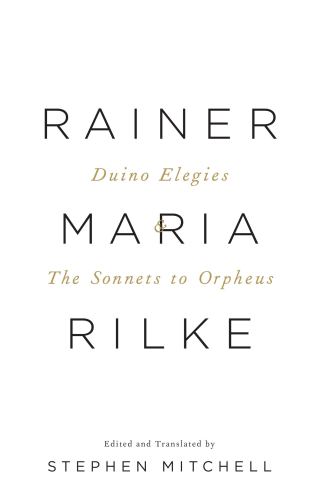“Not because happiness exists, that over-hasty profit from imminent loss, not out of curiosity, or to practice the heart… But because being here is much, and because all that’s here seems to need us.”
In the bleak winter of 1922, a “hurricane of the spirit” swept the ailing and downtrodden Rainer Maria Rilke (December 4, 1875–December 29, 1926) into a rapture of creative vitality. Within a week, he had written his now-iconic Sonnets to Orpheus and completed the suite of ten elegies he had begun a decade earlier amid hollowing loneliness, alienation, poverty, and despair. “I didn’t know that such a storm out of mind and heart could come over a person!” the poet wrote to his publisher in an ecstasy of disbelief, not knowing that he had just composed one of the profoundest and most beautiful works in the poetry of feeling and the poetry of truth — a breakthrough translator Stephen Mitchell calls “the most astonishing burst of inspiration in the history of literature” in his introduction to the bilingual classic Rainer Maria Rilke: Duino Elegies & The Sonnets to Orpheus (public library).

What makes Rilke’s elegies so powerful is the way he takes our elemental human sorrow — the sorrow of living as refugees from reality, of being what he calls “the knowing animals,” creatures “aware that we are not really at home in our interpreted world” — and transmutes it not only into a gladsome acceptance of our limitations, but into a celebration of our capacity for self-transcendence and majesty of mind within those limitations. And so, with his lush verses branching into myriad vectors of possibility, he builds a timeless bower for our dwelling amid the dispossession of this interpreted world.
A century after Rilke, at the fourth annual Universe in Verse (now available as a limited-time weeklong hurricane of a rebroadcast in its entirety through January 1), the poetic astrophysicist and World Science Festival creator Brian Greene read an excerpt from the most poignant of Rilke’s elegies, translated by A.S. Kline — an English mathematician with a literary ardor and a gift for language, creator of the excellent open-access project Poetry in Translation.
Greene — who thinks deeply about science, mortality, and our search for meaning and has explored these questions with uncommon nuance in one of the year’s finest books — prefaced his reading with a beautiful reflection on how our limitation as ephemeral creatures fuels our passion for finding the eternal truths of nature so that we may feel more at home in the universe and in ourselves.
from “THE NINTH ELEGY”
by Rainer Maria RilkeWhy, if it could begin as laurel, and be spent so,
this space of Being, a little darker than all
the surrounding green, with little waves at the edge
of every leaf (like a breeze’s smile)—: why then
have to be human — and shunning destiny
long for destiny?…Oh, not because happiness exists,
that over-hasty profit from imminent loss,
not out of curiosity, or to practice the heart,
which could exist in the laurel…
But because being here is much, and because all
that’s here seems to need us, the ephemeral, that
strangely concerns us. We: the most ephemeral. Once,
for each thing, only once. Once, and no more. And we too,
once. Never again. But this
once, to have been, though only once,
to have been an earthly thing — seems irrevocable.[…]
Earth, is it not this that you want: to rise
invisibly in us? — Is that not your dream,
to be invisible, one day? — Earth! Invisible!
What is your urgent command if not transformation?
Earth, beloved, I will. O, believe me, you need
no more Spring-times to win me: only one,
ah, one, is already more than my blood can stand.
Namelessly, I have been truly yours, from the first.
You were always right, and your most sacred inspiration
is that familiar Death.
See I live. On what? Neither childhood nor future
grows less… Excess of being
wells up in my heart.
For other highlights from The Universe in Verse, savor astronomer Natalie Batalha’s reading of and reflection on Dylan Thomas’s ode to the limitation and wonder of being human, Patti Smith’s reading of Emily Dickinson’s serenade to the science and splendor of how the world holds together, and astrophysicist Janna Levin’s reading of and reflection on the staggering “Antidotes to Fear of Death” by the astronomer and poet Rebecca Elson, then revisit Rilke on the combinatorial nature of creativity, the lonely patience of creative work, and the most difficult art in love.
donating = loving
Bringing you (ad-free) Brain Pickings takes me hundreds of hours each month. If you find any joy and stimulation here, please consider becoming a Supporting Member with a recurring monthly donation of your choosing, between a cup of tea and a good dinner.
newsletter
Brain Pickings has a free weekly newsletter. It comes out on Sundays and offers the week’s most unmissable reads. Here’s what to expect. Like? Sign up.






